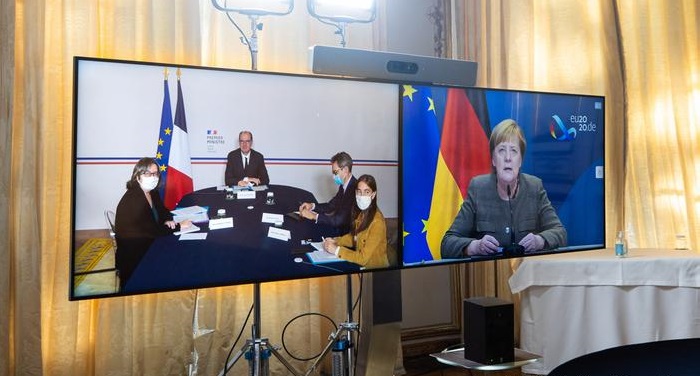
German Chancellor Angela Merkel and French Prime Minister Jean Castex are taking part in a hearing of the Franco-German parliamentary assembly on Monday, where the COVID pandemic and its impact on Europe are high up on the agenda.
The two leaders and the deputies are also discussing a range of topics including climate, refugee, foreign and economic policies.
The assembly — which is supposed to meet on a biannual basis, once in Paris and once in Berlin — is taking place virtually this year due to the ongoing coronavirus health emergency.
Speaking during the meeting, Merkel said that the German government was against a tightening of restrictions against travelers entering the country at the moment. She also opposed imposing the kind of border controls that were temporarily introduced last year to control the spread of the coronavirus.
Border controls are "something very hard," she told the assembly, stressing that she believes "something like this should not be repeated."
The German chancellor called for closer regional coordination in Europe to fight against the pandemic.
"We are also aware that these infection control measures can mean a litmus test for our Europe without borders," she said.
"As partners, we also address common challenges together," Merkel added, referring to France.
What is the Franco-German parliamentary assembly?
The assembly comprises of a total of 100 members of parliament, 50 from Germany's Bundestag and 50 from France's lower house of parliament (Assemblee Nationale).
The body was set up in 2019 and is designed to implement the so-called Aachen treaty signed by Merkel and French President Emmanuel Macron at the end of January 2019.
To this end, it can make proposals concerning Franco-German relations and to cement the special bond between the two countries.
The importance of this panel is "very high for Franco-German relations," Wolfgang Schäuble, president of the Bundestag, told dpa news agency.
"The institutional cooperation achieved in this legislative term alone is unique in Europe and worldwide," he added.
Nevertheless, the body can neither make binding decisions nor does it have its own budget sovereignty.
Every parliamentary group of the Bundestag and the Assemblee Nationale will have at least one seat in the Franco-German assembly. There are currently 15 factions represented in the body, from both parliaments.